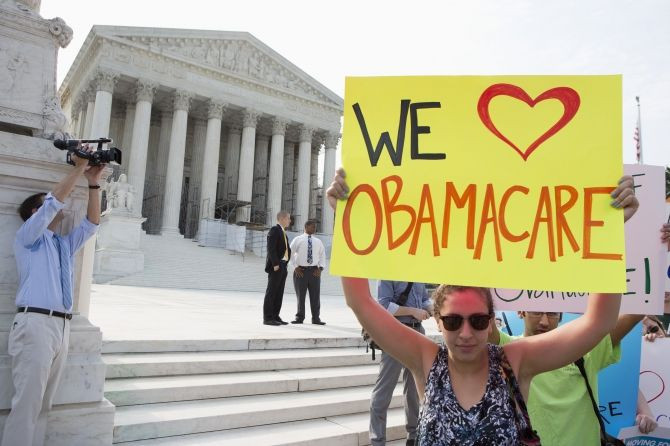Supreme Court Upholds 'Obamacare'

The Supreme Court ruled today on the Patient Protection and Affordable Care Act (ACA). The entire ACA was upheld as constitutional in a suit filed against the federal government by 26 states, several individuals and the National Federation of Independent Business.
The most controversial portion, the individual mandate, was upheld as constitutional. According to the court’s opinion, the individual mandate required that “individuals who are not exempt, and who do not receive health insurance through an employer or government program, […] to purchase insurance from a private company.” It was upheld by Justices Ruth Bader Ginsburg, Sonia Sotomayer, Stephen Breyer, Elena Kagan – and surprisingly, Chief Justice John Roberts, who was appointed by the then President George W. Bush.
The law was upheld with the rationale that, if one refuses to comply with the individual mandate, the person would pay a tax penalty. The court said that the individual mandate does violate the Commerce Clause. However, since Congress’s powers in the Constitution include the power of taxation, that violation does not matter.
The majority opinion diverged at times. Justice Ginsburg would uphold the mandate under the Commerce Clause. She also agreed with the Medicaid penalty against states. However, the overall opinion did not reflect that.
The other provision that was ruled on today was the Medicaid expansion. Currently, the program assists “pregnant women, children, needy families, the blind, the elderly, and the disabled in obtaining medical care.” The Act would expand coverage “to adults with incomes up to 133 percent of the federal poverty level, whereas many States now cover adults with children only if their income is considerably lower, and do not cover childless adults at all.”
The court said that states could refuse to comply with the expansion. If they chose to refuse, their Medicaid eligibility would not suffer, and they could still remain in the program. The states that chose to enroll would receive additional federal money.
Justices Samuel Alito, Anthony Kennedy, Antonin Scalia, and Clarence Thomas dissented from the majority opinion. Justice Kennedy read the dissent. They believed that the entire act was invalid and unconstitutional.
The decision was a reversal from the Court of Appeals, which ruled that the Medicaid expansion was constitutional but that the individual mandate was not.
The Patient Protection and Affordable Care Act was passed in 2010, with the intention of increasing the number of insured Americans and decreasing the cost of health care. It has since proved to be extremely controversial, with the provision requiring an individual mandate dominating the conversation. Other provisions, such as those allowing children up to the age of twenty-six to stay on their parents’ health insurance plans, have been less divisive and, in fact, quite popular.
The individual mandate and the Medicare expansion provisions of the Affordable Care Act will take effect in 2014.
In a public statement in the minutes following the announcement, House of Representatives Speaker John Boehner has renewed his resolve to repeal the law.



























